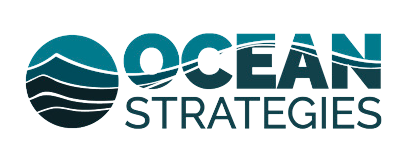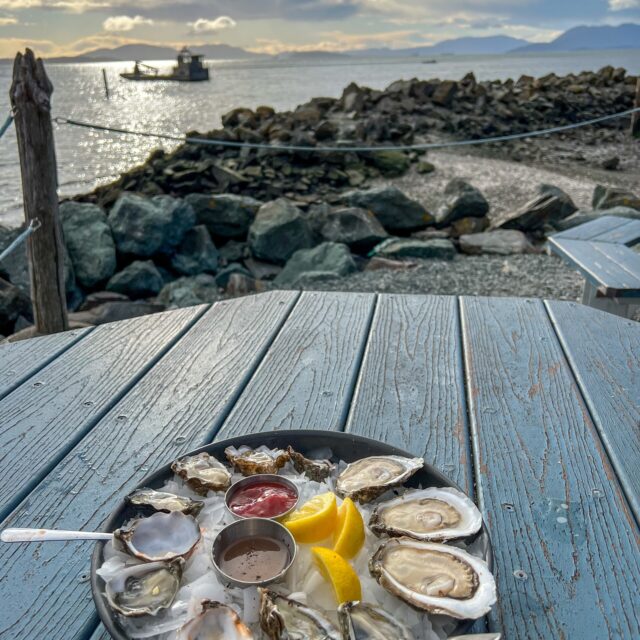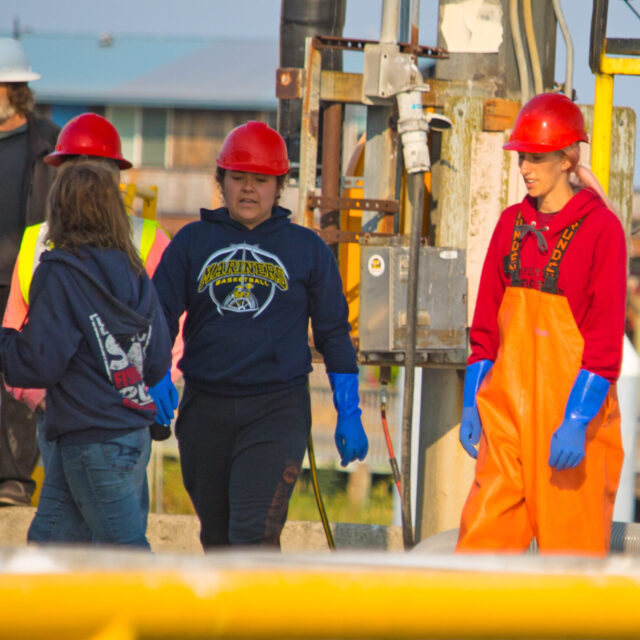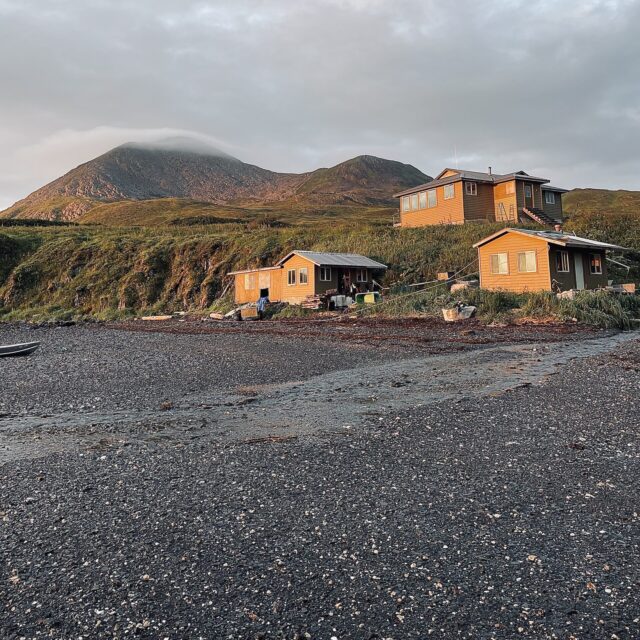Ocean Strategies recently chatted with Diani Taylor, fifth generation shellfish farmer in Washington state and General Counsel for her family business, Taylor Shellfish Farms. Diani discussed the importance of seafood stakeholders engaging in discussion around climate issues, making sure shellfish regulatory processes work for farmers, and increasing diversity among sectors in order to ensure a robust, sustainable, and successful seafood supply chain.
Click the image above to watch and listen to the full interview with Diani Taylor and Ocean Strategies Principal Brett Veerhusen.
Brett: We’re here with Diani Taylor, 5th generation shellfish farmer from Washington State. Diani grew up on the Puget Sound working for her family business, Taylor Shellfish Farms, where she now serves as General Counsel for the company. The Taylor family began farming shellfish in Puget Sound in 1890 and is now the country’s largest producer of farmed shellfish. Diani studied environmental policy and ethics at the University of Montana, and then received her law degree from Seattle University School of Law. Diani is passionate about water quality, food production, and conservation issues, and continually works on the challenges facing the environment we rely on.
Diani, thanks so much for joining us today. We’re excited to tap into your expertise and insight into Washington’s shellfish industry. But first, we like to start with the hard questions: what is your favorite seafood and how do you prepare it?
Diani: I’m going to break the rules and go with two answers because I have way too many favorites! First, I cook a lot of steamed clams at home – they’re simple and easy to change up. You just have to rinse the clams quickly, heat a pan, add butter, onions, and garlic, even some ginger and spicy sauce, and then white wine or chicken broth. Next, you let all of those ingredients boil, and add the clams and cover. Once they’re open all the way, they’re ready! You can eat it with some good bread or rice. It only takes about 3-4 minutes for the clams so it’s easy to overcook them.
Second, oysters on the half shell are impossible to beat. Folks can be hesitant because they don’t know how to shuck them, but there are some really great online tutorials. I love eating them because it’s a different experience every time and that makes it very special.
Brett: Couldn’t agree more. I’ve been lucky enough to eat oysters on the half shell at Taylor Shellfish restaurants in Seattle.They’re delicious and it’s fun to shuck them yourself, it’s really not that hard. I think I’m going to make your clam recipe soon!
Moving into our policy discussion, the nation’s unfed aquaculture industry (or as some call, mariculture – seaweed and shellfish farming) continues to grow and expand, while also facing some uphill battles in terms of permitting and regulations in several regions across the country. What are the policy issues that are most important to Taylor Shellfish and how do those relate to the WA aquaculture sector at large, and the national aquaculture landscape?
Diani: At Taylor Shellfish and throughout the aquaculture industry in general we track policy that relates to climate issues, such as ocean acidification and clean water. These issues are critical to farms and operations so we’re sure to engage in those discussions. Some sector-specific work we’re involved in is related to shellfish regulations and health and safety standards. Taylor Shellfish is also focused on national shellfish regulations and making sure that process works for farmers.
We’re also tracking the draft rules coming out of the Subcommittee on Aquaculture. These are forward looking rules that address regulatory challenges as well as economic and research needs for the industry. There’s an opportunity to create a more robust industry, which includes robust regulations, but ones that work and that people can navigate.
As far as research, one of the things we’re excited about is the work being done on shellfish genetics. Genetics are important to shellfish for a variety of reasons – we use it to make a more marketable product, but also address ocean acidification and make a more resilient oyster.
Brett: I’d love to learn more about that, it sounds like important research being done, making sure there is shellfish longevity and resilience in the face of climate change. I want to move to a recent update. In February of this year, Washington’s shellfish industry received some fantastic news – a new trade agreement between the US and the European Union was established, which allows shellfish farmers to sell their product to European customers for the first time since 2010. What does this agreement mean for WA’s shellfish farmers and the country’s seafood sector in terms of new markets and the economy?
Diani: I am really excited about this! As you mentioned, the EU and U.S. put in a mutual ban on shellfish imports and exports in 2010, so we’ve been trying to address this for over a decade. Before the ban we had a strong market in the EU and good connections with customers. We’ve already started reconnecting with folks to get back into that market. One important thing we’ve learned through Covid is that having diverse markets provides stability for your business.
In the past, the European market was for manila clams and that’s what we’re pursuing again. We’ve got incredible PNW clams and they’re in high demand in Europe.
Brett: Well congrats to the industry and sorry you had to work on this so long! Lastly, I want to bring attention to an important conversation that is happening in the seafood industry – that of establishing more female and diverse representation and recognition throughout the seafood supply chain, but most importantly ensuring there are more women in leadership positions, especially as it relates to discussions around climate issues and seafood-related policies.
As a female leader in Washington’s seafood industry, what would your advice be to other women that want to get involved in the seafood policy discussion, and who want to work toward establishing themselves in those leadership positions?
Diani: This is a really important topic. To have a robust industry, one that is healthy for the long term, it must be increasingly diverse and include more women. That needs to be a priority for the seafood industry as a whole.
My mom dug clams for over 10 years and was a huge inspiration to me as a female leader. We’re in the fifth generation of our family at Taylor Shellfish, and within that I am one of eight, seven of us being women. Women are the future of farming. I am really lucky. I have a lot of support and I get to network with women, but not everyone has that.
My advice for women that want to get into the seafood sector and those leadership positions is to build that network of women so you have others to support and guide you on your path in the industry. There are also great mentors out there, both men and women. I have found many welcoming and supporting mentors in the folks I have reached out to, and have found their advice invaluable.
I would be remiss to not give a shout-out to my sister and cousin that launched Girls That Shuck! This is an online group, mostly through Instagram, and they host space for women in the oyster industry to network, share their stories, and highlight each other’s work. They’re getting ready to launch their second Girls Who Shuck fundraiser. That’s a great way to give back to organizations working to support women in the seafood industry.
Here locally, we used to do Shellfish Divas happy hour! I feel so lucky to have this group of women here to reach out to for support, it feels like a real family.
Brett: Well Diani, we really look up to you and are astonished by your expertise and the great work you’re doing. The seafood industry is lucky to have you as a part of it. Any final words of wisdom?
Diani: Thanks so much. It’s been awesome to connect and work together! One more thought on policy – there is a lot of opportunity for other industries and sectors to come together on some of the priorities for the seafood industry. I see this as a hugely untapped potential. From the Taylor Shellfish lens, we can work together with others on issues like ocean acidification. Some of the greatest work we’ve seen is when groups come together on their aligned priorities.
Brett: It’s encouraging to focus on what we can agree on. Having solution-oriented coalitions and unlikely partnerships focused on what that common ground is can be incredibly effective. A rising tide lifts all boats.




